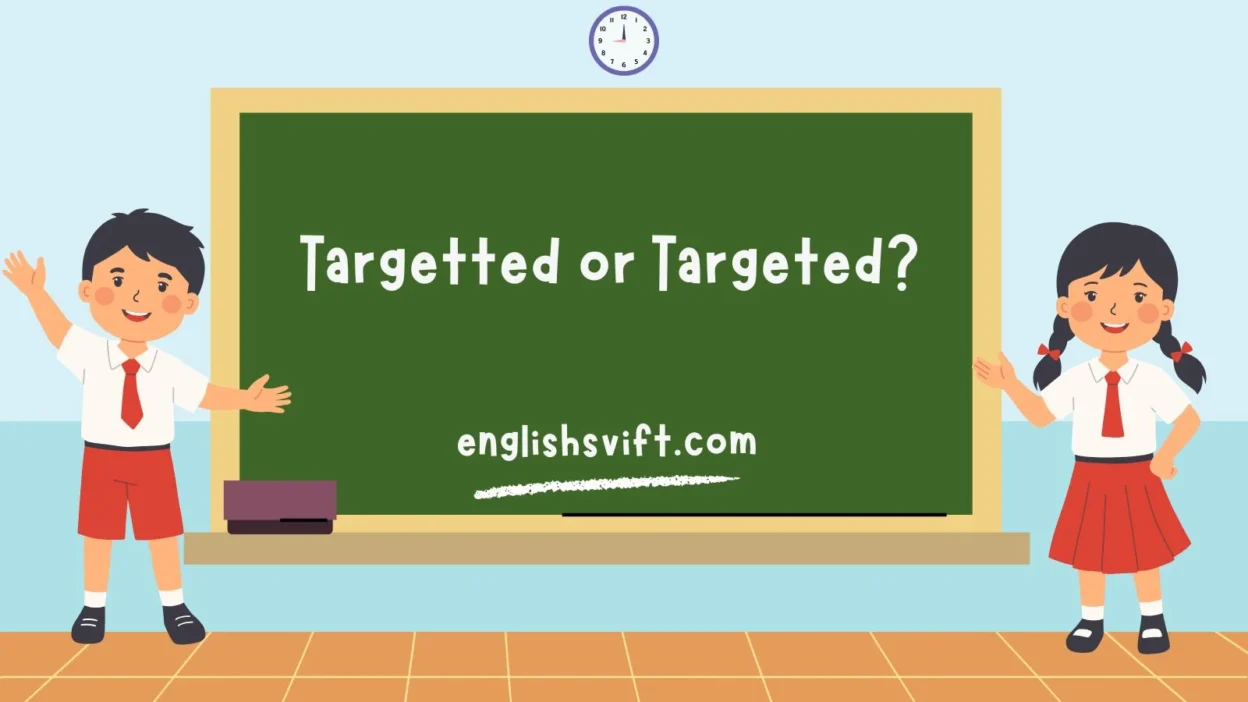Have you ever written an email and paused, wondering if it should be “targetted” or “targeted”? If yes, you’re not alone. This tiny spelling difference causes big confusion—even among professionals.
In this guide, we’ll break down everything you need to know about these words, their correct spelling, grammar rules, and usage across various contexts in 2025.
Understanding the Confusion: Targetted or Targeted?
When you search online or glance through different documents, you might see both spellings. So, which one is correct? The answer is simple:
“Targeted” is the correct and standard spelling.
“Targetted” is considered a misspelling in modern English.
Why “Targeted” is the Standard Spelling in English
In standard English (both American and British), the verb target forms its past tense and past participle by adding “-ed” without doubling the consonant t:
- Base form: target
- Past tense: targeted
- Past participle: targeted
The reason? The final consonant t in “target” is not preceded by a single stressed vowel, which is the usual trigger for doubling consonants. (We’ll explore this rule in detail later.)
Is “Targetted” Ever Correct? Common Misconceptions
Some believe “targetted” is British spelling. Others assume it follows the rule of doubling consonants. Both are incorrect. Dictionaries like Oxford, Merriam-Webster, and Cambridge all list “targeted” as the accepted form globally.
Quote to Remember:
“Language evolves, but correctness remains rooted in rules and recognition.”
Historical Evolution of Spelling Variants
Interestingly, the confusion didn’t arise recently. Older texts occasionally showed “targetted”, but as language standardized through dictionaries and grammar authorities, “targeted” prevailed. Today, using targetted in formal writing signals error, not style.
Grammar Rules: Double Consonant or Single?
Let’s settle the consonant doubling debate. English has a rule for doubling final consonants when forming the past tense:
- If a verb ends in a single consonant preceded by a single stressed vowel, double the consonant.
- Examples:
- beg → begged
- occur → occurred
- beg → begged
But target doesn’t meet this condition because:
- The final syllable is not stressed.
- The t is preceded by two letters (e and t combined sound).
Table: Doubling vs Not Doubling Examples
| Verb | Base Form | Past Tense | Why Doubled? |
| beg | beg | begged | Single stressed vowel |
| occur | occur | occurred | Final syllable stressed |
| permit | permit | permitted | Stress on last syllable |
| target | target | targeted | Last syllable unstressed |
| focus | focus | focused | No stress on last syllable |
British vs American Spelling Conventions
Many words differ between British and American English (e.g., travelled vs traveled). But when it comes to targeted, there’s no variation. Both dialects agree:
targeted is correct.
Present and Past Tense Forms of “Target”
Let’s review its forms:
| Tense | Example Sentence |
| Present | We target our audience carefully. |
| Past | The company targeted young consumers. |
| Future Perfect | We will have targeted all key markets. |
Notice how “targeted” stays consistent.
Doubling Rules for Verbs: When and Why It Happens
When forming past tense, doubling occurs only when:
- The verb is short, ending in consonant + vowel + consonant.
- The stress falls on the final syllable.
Examples:
- patrol → patrolled
- permit → permitted
But target doesn’t satisfy these conditions, so no double t.
Common Examples of Double Consonants in English
Here’s a quick reference:
| Correct | Incorrect |
| targeted | targetted |
| focused | focussed (UK allows in rare cases) |
| benefited | benefitted (UK sometimes allows) |
Targetted vs Targeted in Business and Marketing
In business communication, spelling mistakes can hurt credibility. Imagine reading:
- “Our targetted campaigns drive success.”
It immediately feels unprofessional, right?
Always use targeted in:
- Marketing reports
- Campaign strategies
- Digital ads
- Investor presentations
Digital Campaigns: How Spelling Impacts Professionalism
Online content lives forever. A typo in an ad can:
- Undermine trust
- Lower click-through rates
- Damage brand authority
Pro Tip: Use spell-checkers or grammar tools before publishing campaigns.
Targeted Messaging in Advertising and Communications
“Targeted” isn’t just about spelling; it’s about precision in communication. In marketing:
- Targeted advertising = Reaching a specific demographic.
- Targeted campaigns = Tailored strategies for better engagement.
Synonyms for “Targeted” and When to Use Them
| Synonym | When to Use |
| aimed | General focus |
| directed | Formal writing |
| tailored | Personalized content |
| intended | Planned actions |
| specified | Technical documentation |
Examples of Targeted Usage in Different Contexts
- Healthcare: Targeted treatments improve patient outcomes.
- Technology: Software offers targeted solutions for niche markets.
- Education: Teachers design targeted programs for struggling students.
Targeted in Healthcare, Security, and Technology Fields
Healthcare: Targeted therapy for cancer patients.
Security: Targeted interventions against cyber threats.
Technology: Targeted analytics for app development.
How Misspelling Can Undermine Credibility
A single misspelling like targetted can:
- Lower trust
- Signal lack of attention to detail
- Make communication look unprofessional
Tools and Techniques for Correct Spelling
- Grammarly for real-time checks
- Oxford Dictionary for authoritative spelling
- Manual proofreading for important documents
Understanding Grammar Authorities and Dictionary References
Top references agree:
- Oxford English Dictionary: targeted
- Cambridge Dictionary: targeted
- Merriam-Webster: targeted
Practical Tips for Writing Accuracy and Clarity
- Always proofread twice.
- Follow style guides.
- Avoid relying solely on autocorrect.
Common Mistakes and How to Avoid Them
| Mistake | Correction |
| targetted | targeted |
| benefitted | benefited |
| focussed | focused |
Professional Writing: Maintaining Consistency and Standards
In academic papers, business proposals, and marketing content, spelling consistency shows professionalism and attention to detail.
FAQs
Q1. Which is correct: Targetted or Targeted?
A: Targeted is correct. Targetted is a misspelling.
Q2. Why isn’t “targetted” correct?
A: The consonant isn’t doubled because the final syllable is not stressed.
Q3. Is “targetted” accepted in British English?
A: No, both British and American English prefer targeted.
Q4. What about other words like “focused” vs “focussed”?
A: “Focused” is standard, but British English sometimes accepts “focussed.”
Q5. How do I avoid this mistake?
A: Use grammar tools and check authoritative dictionaries.
Conclusion
Language evolves, but correctness remains non-negotiable. In 2025, the right choice is clear:
Use targeted.
Avoid targetted.
Getting spelling right isn’t just about grammar—it’s about credibility, professionalism, and effective communication.


